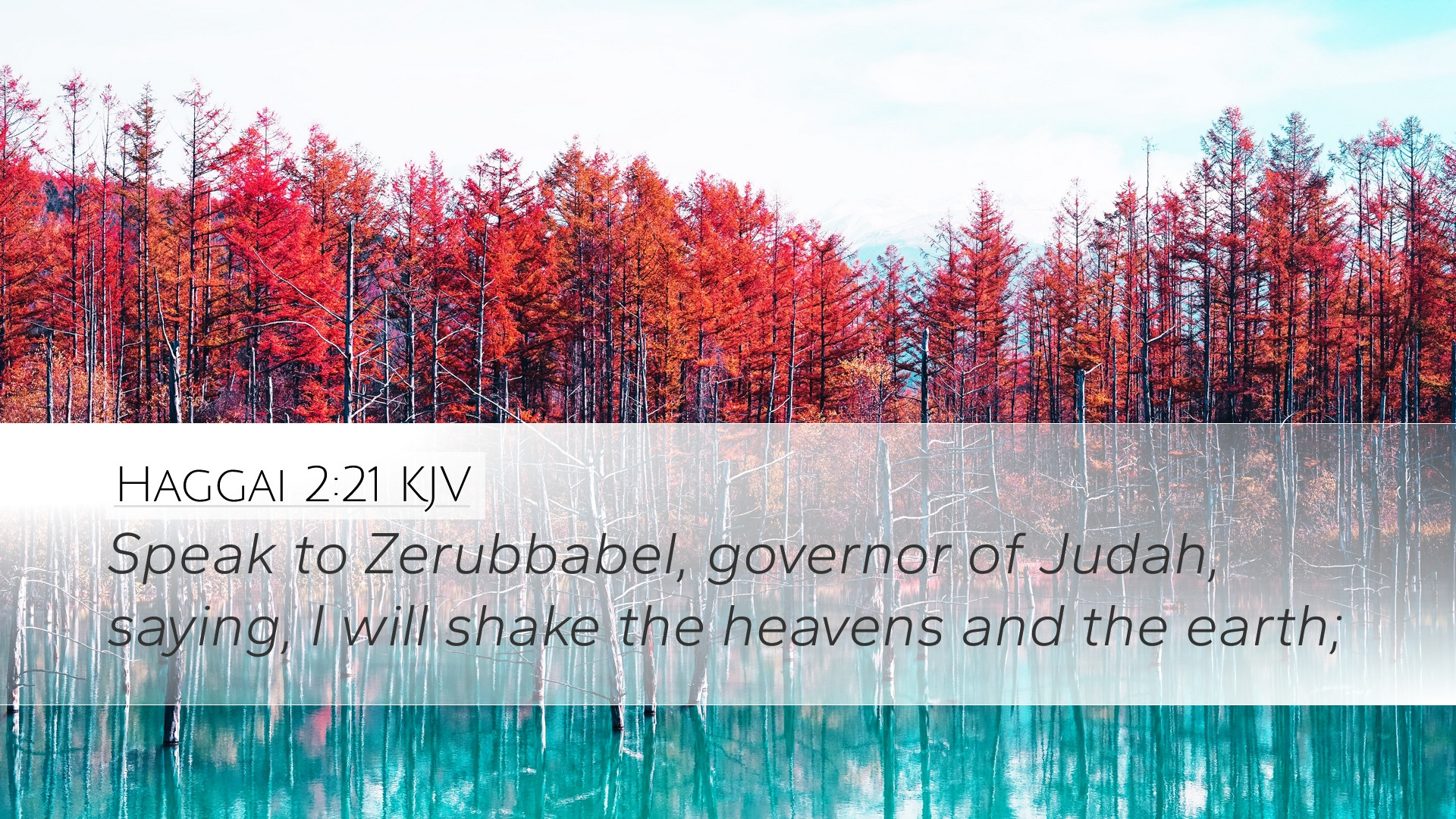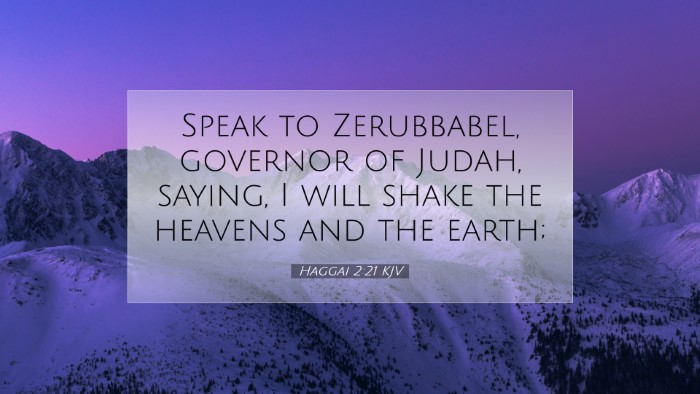Old Testament
Genesis Exodus Leviticus Numbers Deuteronomy Joshua Judges Ruth 1 Samuel 2 Samuel 1 Kings 2 Kings 1 Chronicles 2 Chronicles Ezra Nehemiah Esther Job Psalms Proverbs Ecclesiastes Song of Solomon Isaiah Jeremiah Lamentations Ezekiel Daniel Hosea Joel Amos Obadiah Jonah Micah Nahum Habakkuk Zephaniah Haggai Zechariah MalachiHaggai 2:21
Haggai 2:21 KJV
Speak to Zerubbabel, governor of Judah, saying, I will shake the heavens and the earth;
Haggai 2:21 Bible Commentary
Commentary on Haggai 2:21
Verse Context: Haggai 2:21 states, "Speak to Zerubbabel, governor of Judah, saying, I will shake the heavens and the earth." This verse is a part of Haggai’s second message, which emphasizes God's sovereignty and His promise of restoration to His people.
Historical Background
The book of Haggai was written during a critical period in Israel's history, approximately 520 B.C., when the Jews had returned from Babylonian captivity. They faced significant challenges, including discouragement due to the opposition they encountered while rebuilding the temple. The prophet Haggai’s purpose was to encourage the reconstruction of the temple, thus restoring proper worship and the sense of national identity.
The Divine Assurance
God’s Sovereign Control: Haggai 2:21 affirms God's absolute authority over all creation. The phrase "I will shake the heavens and the earth" signifies a divine intervention that transcends earthly powers. According to Matthew Henry, this shaking suggests a disruption of the current order to establish a new era of God’s reign, signifying both judgment and blessing.
Implications for Zerubbabel
Symbol of Leadership: Zerubbabel, mentioned here, is a descendant of David and a key figure in the restoration of Jerusalem and the temple. Throughout the public domain commentaries, such as Albert Barnes and Adam Clarke, Zerubbabel is seen not only as a leader but also as a type of Christ, foreshadowing the ultimate restoration through Jesus.
Courage and Encouragement: The message to Zerubbabel serves to bolster his resolve against opposition. The shaking of the heavens and earth is not merely a display of power but a promise that God will secure the future of His people. Haggai's words provide comfort in the face of adversity, assuring believers that God is at work even when circumstances appear dire.
Theological Significance
Haggai 2:21 also brings to light several theological themes:
- The Sovereignty of God: God’s capacity to shake the heavens and the earth underscores His control over the universe. The acknowledgment of God’s power is essential for faith and obedience, as observed in Matthew Henry’s reflections on divine providence.
- Restoration of Worship: The rebuilding of the temple was central to Israel’s worship. This verse highlights God’s intention to restore not only the physical structure but also the spiritual relationship between Him and His people.
- Hope for the Future: The promise of shaking can also be interpreted as a precursor to greater blessings. As discussed by Albert Barnes, this shaking symbolizes the removal of oppressive regimes and the arrival of God's kingdom.
Application for Today
The exhortation to Zerubbabel resonates in the present-day church, urging contemporary leaders to rely on God's promises amid challenges. Adam Clarke emphasizes the importance of faith during turbulent times, encouraging believers to remain steadfast in their mission to spread the gospel and maintain worship in a world often characterized by chaos.
Trust amid Trials: Just as Zerubbabel was encouraged with God's promise, modern believers are reminded that God is still actively involved in history. The metaphor of shaking reminds us that God can transform circumstances and bring about His purposes in unforeseen ways.
Call to Action: Pastors and leaders should take to heart the implications of divine empowerment as they guide their congregations. Emphasizing reliance on God during significant transitions or crises can inspire faith and community resilience.
Conclusion
Haggai 2:21 serves as a potent reminder of God's overarching control over history, His deep concern for His people, and His promise of restoration. By examining this verse through the lenses of historical context, leadership, theological implications, and modern applications, we glean profound insights that can strengthen our faith and bolster our efforts in ministry.


